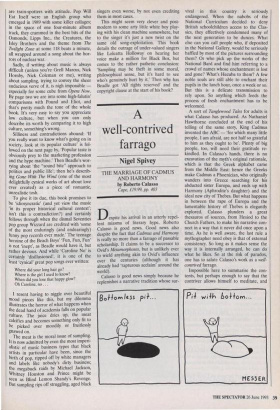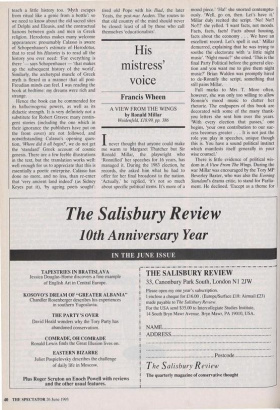A well-contrived farrago
Nigel Spivey
THE MARRIAGE OF CADMUS AND HARMONY by Roberto Calasso Cape, £19.99, pp. 403 Despite his arrival in an utterly repel- lent miasma of literary hype, Roberto Calasso is good news. Good news also despite the fact that Cadmus and Harmony is really no more than a farrago of passable scholarship. It claims to be a successor to Ovid's Metamorphoses, but is unlikely ever to wield anything akin to Ovid's influence over the centuries (although it has already had 'rapturous acclaim' around the world). Calasso is good news simply because he replenishes a narrative tradition whose sur- vival in this country is seriously endangered. When the nabobs of the National Curriculum decided to deny British schoolchildren access to the Clas- sics, they effectively condemned many of the next generation to be dunces. What else can you call people who, if deposited in the National Gallery, would be seriously baffled by most of the pictures surrounding them? Or who pick up the works of the National Bard and find him referring to a crowd of names whose enchantment is lost and gone? What's Hecuba to them? A few noble souls are still able to enchant their pupils in the lunch hour, once a week or so. But this is a delicate transmission to rely upon. So anything which feeds the process of fresh enchantment has to be welcomed.
A sort of Tanglewood Tales for adults is what Calasso has produced. As Nathaniel Hawthorne concluded at the end of his telling of the same story, King Cadmus invented the ABC — 'for which many little people, I am afraid, are not half so grateful to him as they ought to be'. Plenty of big people, too, will need their gratitude re- kindled. In Calasso's hands, there is no excavation of the myth's original rationale, which is that the Greek alphabet came from the Middle East: hence the Greeks make Cadmus a Phoenician, who originally wanders into Greece searching for his abducted sister Europa, and ends up with Harmony (Aphrodite's daughter) and the ideal new city of Thebes. But what happens in between the rape of Europa and the lamentable history of Thebes is elegantly explored. Calasso plunders a great thesauros of sources, from Hesiod to the Church Fathers, to make his narrative con- nect in a way that it never did once upon a time. As he is well aware, the last rule a mythographer need obey is that of external consistency. So long as it makes sense the way it is internally arranged, he can do what he likes. So at the risk of paradox, one has to salute Calasso's work as a well- contrived farrago.
Impossible here to summarise the con- tents, but perhaps enough to say that the contriver allows himself to meditate, and teach a little history too. 'Myth escapes from ritual like a genie from a bottle': so we need to know about the old sacred sites of Delphi and Eleusis, and the contractual liaisons between gods and men in Greek religion. Herodotus makes many welcome appearances: presumably Calasso is aware of Schopenhauer's estimate of Herodotus, that to read his Histories is to read all the history you ever need: 'For everything is there '— says Schopenhauer — 'that makes up the subsequent history of the world'. Similarly, the archetypal muscle of Greek myth is flexed in a manner that all post- Freudian minds can feel. I was reading the book at bedtime: my dreams were rich and strange.
Hence the book can be commended for its hallucinogenic powers, as well as its didactic strength. It is very definitely not a substitute for Robert Graves: many contin- gent stories (including the one which in their ignorance the publishers have put on the front cover) are not followed, and notwithstanding Calasso's opening ques- tion, 'Where did it all begin?', we do not get the 'standard' Greek account of cosmic genesis. There are a few feeble illustrations in the text, but the translation works well: well enough for us to appreciate that this is essentially a poetic enterprise. Calasso has done no more, and no less, than re-enter that 'very ancient land indeed' (as Sidney Keyes put it), `by ageing poets sought': tired old Pope with his Iliad, the later Yeats, the post-war Auden. The routes to that old country of the mind should never be closed: least of all by those who call themselves 'educationalists'.



























































 Previous page
Previous page